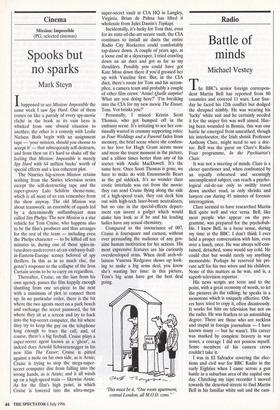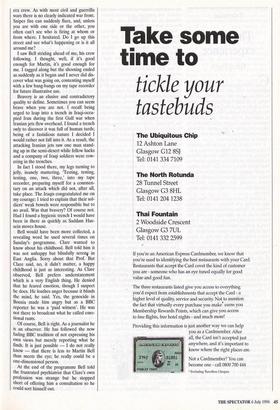Radio
Battle of
minds
Michael Vestey
The BBC's senior foreign correspon- dent Martin Bell has reported from 80 countries and covered 11 wars. Last Sun- day he faced his 12th conflict but dodged the shrapnel nimbly. He was wearing his 'lucky' white suit and he certainly needed it for the sniper fire was well aimed. Hav- ing been wounded in Bosnia, this was one battle he emerged from unscathed, though his interlocutor, the Irish shrink Professor Anthony Clare, might need to see a doc- tor. Bell was the guest on Clare's Radio Four programme, In the Psychiatrist's Chair.
It was not a meeting of minds. Clare is a clever questioner and, when confronted by an equally rehearsed and seemingly uncomplicated subject, can reach a psycho- logical cul-de-sac only to swiftly travel down another road, as only shrinks and lawyers can during 45 minutes of forensic interrogation.
Clare seemed to have researched Martin Bell quite well and vice versa. Bell, like most people who appear on the pro- gramme, was prepared for the psychobab- ble. I knew Bell, in a loose sense, during my time at the BBC. I don't think I ever held a proper conversation with him, even over a lunch, once. He was always self-con- tained, detached, some would say cold. He could chat but would rarely say anything memorable. Perhaps he reserved his pri- vate self for his two wives and his children. None of this matters as he was, and is, a superb television reporter.
His news scripts are terse and to the point, with a great economy of words, to let the pictures do the talking; he speaks in a monotone which is uniquely effective. Oth- ers have tried to copy it, often disastrously. It works for him on television but not on the radio. He was fearless to an astonishing degree. There are those who are reckless and stupid in foreign journalism — I have known many — but he wasn't. His career was marked by complete bravery in war zones, a courage I did not possess myself. Some members of his camera crews couldn't take it.
I was in El Salvador covering the elec- tions and civil war for BBC Radio in the early Eighties when I came across a gun battle in a suburban area of the capital one day. Clutching my tape recorder I moved towards the deserted streets to find Martin Bell in his familiar white suit and the cam- era crew. As with most civil and guerrilla wars there is no clearly indicated war front. Sniper fire can suddenly flare, and, unless you are with one side or the other, you often can't see who is firing at whom or from where. I hesitated. Do I go up this street and see what's happening or is it all around me?
I saw Bell striding ahead of me, his crew following. I thought, well, if it's good enough for Martin, it's good enough for me. I tagged along but the shooting ended as suddenly as it began and I never did dis- cover what was going on, contenting myself with a few bang-bangs on my tape recorder for future illustrative use.
Bravery is an elusive and contradictory quality to define. Sometimes you can seem brave when you are not. I recall being urged to leap into a trench in Iraqi-occu- pied Iran during the first Gulf war when Iranian jets flew overhead. I found a trench only to discover it was full of human turds; being of a fastidious nature I decided I would rather not fall into it. As a result, the attacking Iranian jets saw one man stand- ing up in the semi-desert while fellow hacks and a company of Iraqi soldiers were cow- ering in the trenches.
In fact I stood there, my legs turning to jelly, inanely muttering, `Testing, testing, testing, one, two, three,' into my tape recorder, preparing myself for a commen- tary on an attack which did not, after all, take place. The Iraqis congratulated me on my courage: I tried to explain that their sol- diers' weak bowels were responsible but to no avail. Was that bravery? Of course not. Had I found a hygienic trench I would have been in there as quickly as Saddam Hus- sein moves house.
Bell would have been more collected, a revealing word he used several times on Sunday's programme. Clare wanted to know about his childhood. Bell told him it was not unhappy but blissfully serene in East Anglia. Sorry about that Prof. But Clare said, no, it didn't matter, a happy childhood is just as interesting. As Clare observed, Bell prefers understatement which is a very English thing. He denied that he feared emotion, though I suspect he does. He loathes anger because it blinds the mind, he said. Yes, the genocide in Bosnia made him angry but as a BBC reporter he was a 'paid witness'. He was not there to broadcast what he called emo- tional rants.
Of course, Bell is right. Asa journalist he is an observer. He has followed the now fading BBC tradition of not expressing his own views but merely reporting what he finds. It is just possible — I do not really know — that there is less to Martin Bell than meets the eye; he really could be a one-dimensional person.
At the end of the programme Bell told the frustrated psychiatrist that Clare's own profession was strange but he stopped short of offering him a consultation so he could sort himself out.



























































 Previous page
Previous page